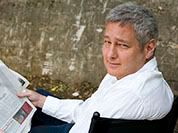Rove: Deserting rat denies sinking the ship
There’s a new book coming out that purports to give an inside view of some of the secret squabbling that’s gone on over the past seven years inside the Bush White House. This would not be considered a big deal, except for the fact that one of the author’s informants appears to have been Karl Rove, who apparently shared a couple of “juicy stories” with the author some months prior to his departure from the White House.
The fact is: if the AP story on the release of the book is anything to go by, the “juicy stories” told by Rove are not all that juicy. See here:
Book Tells Of Dissent In Bush's Inner Circle
White House Granted Author Unusual Access
By Michael Abramowitz
Washington Post Staff Writer
Monday, September 3, 2007; A01
Karl Rove told George W. Bush before the 2000 election that it was a bad idea to name Richard B. Cheney as his running mate, and Rove later raised objections to the nomination of Harriet E. Miers to the Supreme Court, according to a new book on the Bush presidency.
In "Dead Certain: The Presidency of George Bush," journalist Robert Draper writes that Rove told Bush he should not tap Cheney for the Republican ticket: "Selecting Daddy's top foreign-policy guru ran counter to message. It was worse than a safe pick -- it was needy." But Bush did not care -- he was comfortable with Cheney and "saw no harm in giving his VP unprecedented run of the place."
When Rove, President Bush's top political adviser, expressed concerns about the Miers selection, he was "shouted down" and subsequently muted his objections, Draper writes, while other advisers did not realize the outcry the nomination would cause within the president's conservative political base.
See what I mean? Obviously this isn’t Rove dishing all the dirt he could, nobody expects that he will do that; that would kill these guys dead, once and for all.
Instead, this is Rove sluffing off any personal responsibility for a couple of f-ups that he'd rather not get blamed for, given the fact that he is widely acknowledged to be one of GWB’s two brain cells. (The other is Cheney.)
What’s interesting is that Rove is talking at all about this stuff. That fact makes it clear that he wants to remain active in the GOP and conservative politics. To do that, he has to make sure that he is not made a fall guy for the failed political strategies of what is surely the most incompetent and disastrous White House since the Nixon administration.
Remember that a key element of the Rove strategy was to preach bi-partisanship and “a new tone in Washington” on the way in, while secretly planning to run the most partisan White House in modern history. Bush continued to campaign vigorously on behalf of the GOP and its candidates long after he was elected, working not to negotiate with Democrats and build consensus (as he promised) but to replace them. And Rove’s behind-the-scenes efforts—e.g., politicizing the Justice Department so that it would “go after” Democrats and Democratic voters—reflected the same view: purge American political life of liberals and Democrats by any means necessary, to ensure a conservative hegemony for decades to come.
All ends were directed to domestic political ends: how to respond to terrorist strikes at the US, how to run the economy (deficit spending dressed up as conservatism), questions involving foreign policy, questions of war and peace and how to direct the Pentagon—all national and international questions became secondary, directed to an ultimate goal: the lasting and hopefully permanent triumph of conservative Republican power. The future envisioned by Rove had little to do with America and America’s interests, and everything to do with the interests of Republicans and conservatives. He worked for a divided America, a future of well-funded conservatives using a permanent state of crisis and a nationwide right-wing media to dominate a marginalized liberal rump party that would be stereotyped as a weakling counter-culture of potential traitors and socialist wannabes.
To say that “Rove’s plan backfired” amounts to comic understatement. The Bush White House, with every possible advantage of prosperity, money, and media, torpedoed its own party via sheer incompetence in policymaking. Their characteristic response to crisis and disaster was to expand the scope and severity of those crises and disasters. That’s because Rove’s take on the world and politics is wrong. National and international policy questions are not matters of public perception; spin and effectiveness in destroying one’s political opposition at home.
But Rove does not want to spend the rest of his life with a reputation as “the guy who destroyed the conservative hegemony over American politics.” So he’s signaling his willingness to talk, if necessary. To spread the blame for the GOP disaster by minimizing his own role in specific Bush White House disasters: “Hey, I’m not the guy who said Cheney should run Bush foreign policy—I was against his appointment as veep. Hey, I’m not the guy who was responsible for the Miers debacle.”
Hopefully, this is just the tip of the iceberg. Hopefully, Rove will keep talking and other key Bush personnel will start to talk about how the disasters came about, in order to try to salvage their own historical reputations. It’s heartening to see the regime turn against its own, even if they’re only doing so to try to save their own careers.



0 Comments:
Post a Comment
<< Home